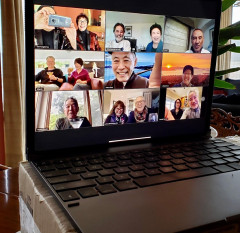Lifestyle Spotlight
The Year of Sheltering Dangerously By Ben Fong-Torres
Lifestyle
Astronaut Leroy Chiao blasts off for his new adventure in Space
Astronaut Leroy Chiao blasts off in Soyuz for his new adventure in Space
Astronaut Leroy Chiao is on his way to a new adventure in Space. The Soyuz TMA-5 spaceship carrying Dr. Chiao, Expedition 10 commander and NASA International Space Station (ISS) science officer, cosmonaut Salizhan S. Sharipov, Russias Federal Space Agency flight engineer and Soyuz commander, and Russian Space Forces cosmonaut Yuri Shargin to the ISS, blasted off at 11:06pm EST on Oct. 13 (9:06 a.m. Baikonur time (306 GMT) on Oct. 14).
The crew is scheduled to dock to the Station on Oct. 16.
Chiao and Sharipov will replace the current Station crewmembers, cosmonaut Gennady I. Padalka, Expedition 9 commander, and astronaut Edward M. (Mike) Fincke, NASA ISS science officer and flight engineer, who will return to Earth Oct. 24 with Shargin.
Click here for AsianConnections' exclusive interview with Leroy.
Swimming to New Orleans - One Man's Search for Friends and Family
First-person
narrative,
by
Nick
Glassman,
Sep
07,
2005
NCM
-
Pacific
News
Service
Editor's Note: A SF Bay Area man goes to New Orleans after Hurricane Katrina and finds a war zone of floating bodies, armed and angry survivors and threatening policemen.
I just returned this past weekend from my first trip to Louisiana since Katrina. It's beyond what you can imagine -- it's hell on Earth.
First-person
narrative
by
Nick
Glassman,
Sep
07,
2005
Tea Flavonoids Act as Potent Antioxidants
Tea flavonoids act as potent antioxidants and have been shown to induce cancer cell death and growth while bolstering the body's immune system defenses against the disease.
According to a study published in the latest issue of Archives of Internal Medicine*, black tea consumption is inversely associated with the risk of ovarian cancer. This population-based study followed over 61,000 Swedish women aged 40-76 over a 15-year period, and noted a dose-response relationship between tea consumption and incidence of ovarian cancer. Compared to women who reported not drinking tea, those who drank two or more cups per day had a 46 percent lower risk of developing ovarian cancer.
The Iowa Women's Cohort study, conducted in the U.S., also suggests that weekly consumption of tea is associated with a reduced risk of ovarian cancer.
"The size of this study helps build a case that tea flavonoids have the ability to help protect against cancer in a varieties of ways," said Douglas Balentine, Ph.D., Director Nutrition Sciences Unilever North America. "Tea flavonoids act as potent antioxidants and have been shown to induce cancer cell death and growth while bolstering the body's immune system defenses against the disease."
Cancer is a multifactorial disease, but it is clear that diet can play a role in helping to reduce the risk of many types of cancer.
*
Larsson
SC,
Wolk
A.
Tea
Consumption
and
Ovarian
Cancer
Risk
in
a
Population-Based
Cohort.
Arch
Intern
Med.
Dec
12/26
2005;165.
Remembering Betty: The Voice of Flight 11
Remembering Betty: The Voice of Flight 11
by Lynda Lin, September 11, 2006
Pacific
Citizen,
a
member
of
New
America
Media


